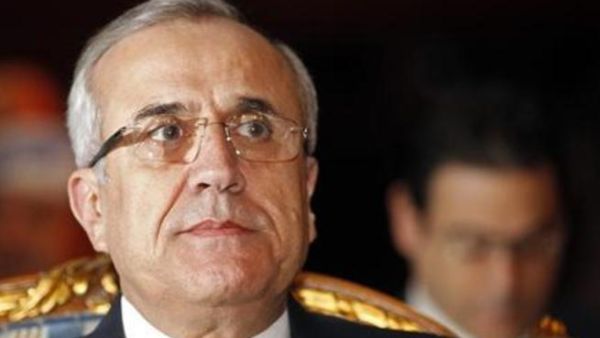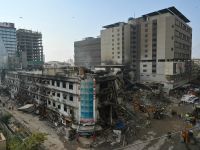Lebanon’s economy will end 2012 on a negative note as political and security instability drags on with medium- and long-term economic indicators showing continuing signs of mediocrity, experts told The Daily Star Monday.
“The year would now most probably end in negative GDP growth. Growth was already negative or near zero in the second and third quarters,” chief economist at Byblos Bank Nassib Ghobril told The Daily Star.
“We had expected a quiet fourth quarter when some compensation should have taken place given that it is the quarter of highest trade activity. But now this is obviously impossible,” he added.
Several international financial institutions have downgraded Lebanon’s 2012 GDP forecast since the Syrian crisis broke out last year. In its latest report, the IMF forecasted GDP growth at 1.5 percent.
Ghobril added that consumer confidence would take a severe hit following the blast which hit Beirut’s Ashrafieh neighborhood, killing police intelligence chief Wissam al-Hasan and at least two other people.
“Security incidents particularly deal devastating blows to consumer confidence in Lebanon.”
When asked about the impact of the security turmoil on vital economic indicators, Ghobril said more time is needed to assess potential damage.
But he said the Central Bank has enough reserves to prevent any deterioration in exchange rates of the Lebanese pound. He added that the Central Bank is in full control of the country’s monetary situation.
A recent report by Ernst & Young said foreign direct investments in Lebanon plummeted 84 percent year on year to $96.5 million in the first half of 2012.
Independent economist Ghazi Wazni told The Daily Star that the impact would hit the already-struggling commerce and tourism sectors the hardest.
He expected tourism to be brought to a halt during the next few months and commercial activity to fall further by up to 10 percent. Decline in retail sales over the past few months reached between 20 to 25 percent, he added.
Head of the Beirut Chambers of Commerce also told several local news outlets this week that the tourism sector’s revenues have fallen by as much as 80 percent in the first nine months of 2012.
While the banking and real estate sector are more immune to short-term consequences, Wazni said growth in the two sectors could be hit hard if the current situation persisted.
“If political and security crisis carry on, then the two vital sectors could also see a recession mirroring the vulnerable commerce and tourism sectors,” Wazni said, adding that the more resilient industrial and agricultural sectors would be also in the danger zone if such a scenario materializes.
Most Lebanese banks have reported nearly flat growth in net profits for the first half of 2012 with profits expected to plunge by nearly 25 percent next year, Byblos Chairman Francois Bassil told The Daily Star recently.
Adviser to the chairman of Fransabank, Joe Sarrouh, told The Daily Star that the financial sector remains immune to the latest security incidents.
“Today was business as usual and there was nothing extraordinary in terms of demand for conversion to dollars, and we did not see any signs of capital flight. Over the next week, everything should clarify and I expect the situation to go back to normal,” the adviser said.
Economic activity remains stagnant and has an impact on the sector but not in a way that would lead to a decline in deposits and assets, Sarrouh said.
“I still expect deposits to grow 7.8 percent and assets to increase by up to 10 percent [by the end of 2012] in spite of the slowdown,” he said.
Regional unrest, international economic downturn and security incidents have also been blamed for the country’s widening deficit in balance of payments.
The deficit soared to $1.84 billion in the first eight months.
Given the sharp decline in the country’s financial inflows, many economists have warned that the soaring trade deficit could also risk economic stability. Lebanon’s trade deficit widened 19 percent year-on-year to $11.57 billion during the first eight months of this year, according to the Customs Department.
Following Friday’s explosion, capitalization at the Beirut Stock Exchange fell 0.65 percent to reach $9.95 million as Solidere A and Solidere B dropped 1.05 and 1.12 percent to $12.25 and $12.27 respectively.
Hotels in the capital also reported mass cancellations, dealing a tremendous blow to the tourism sector, which has been already ailing, as the rest of the economy, for the most of 2012.








